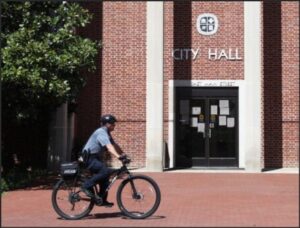Earlier this year Charlottesville police officer Joseph Wood stopped a vehicle driven by a local musician, LaQuinn Gilmore. Gilmore proved uncooperative and, according to local media reports, the encounter ended with Wood throwing Gilmore to the ground. A subsequent internal affairs investigation found that Wood had unlawfully detained Gilmore, but rejected other claims, including the use of excessive force and racial bias.
Was the internal police review too lenient? Was it a case of police officers looking out for their own?
Beginning in March a newly-renamed Charlottesville Police Civilian Oversight Board will assume expanded powers to investigate complaints against the police. The civilian review board has no parallel in Virginia. “If you look around at the other ordinances that have been passed by other places in Virginia,” said Councilor Lloyd Snook, as quoted by The Daily Progress, “we have given to our PCRB — soon to be the PCOB — more authority to do more things than any other place in the state.”
A key feature of the ordinance approved by City Council yesterday was an expansion of who could file a complaint. Previously, someone had to be an aggrieved party or a witness to an incident. That is no longer the case. There will be no restrictions on who can file a complaint. To minimize frivolous filings, however, the ordinance also gives the review board discretion not to pursue a complaint.
Police officers are human, and, like everyone else, they can make errors of judgment — often when called upon to make split-second decisions under stressful conditions such as when dealing with uncooperative or actively- resisting subjects. The Daily Progress cited two Charlottesville police investigations that resulted in the termination of officers.
Every local government needs a mechanism to review and if necessary punish officers for unacceptable conduct. The questions are: who conducts the review, and who sets the rules? Does Charlottesville really need closer oversight? Will that oversight prove to be any more objective than internal police reviews?
The situation in Charlottesville is delicate. Police morale is low. Many African-Americans do not readily comply with police commands and have taken to filming encounters with their cell phones, as the Wood incident shows. Furthermore, the university community is full of anti-police activists, any of whom can now file a complaint even if they were not personally involved in an incident. In theory, the review board can refuse to hear frivolous complaints. But consider who the board members are. Who appointed them? How likely are they to share the community’s pervasive anti-police sentiment?
My instincts tell me this will not end well. Charlottesville police morale is already poor, and the prospect of citizen activists on the board siding with citizen activists filing complaints will do little to improve it. But who knows? Perhaps the members of the police review board will prove to be sober-minded, judicious and fair. I don’t want to pre-judge.
One thing for sure: this experiment in social justice will be worth watching.
